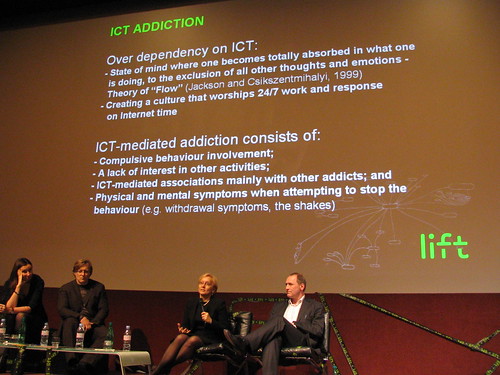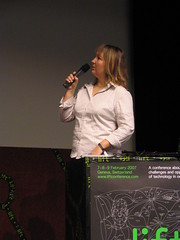Technological overload (oh, I hadn’t realised this was a panel!) — again, Bruno has some nicely-written notes to share.
Fun crackberry video from YouTube.
The moderator loves his crackberry, but he’s an addict.
The panelists don’t blog! What a shame! Not much IM either… (that was a steph-note)
steph-note: We’re asked to close laptops for Nada Kakabadse’s presentation. Reminds me of “Le Test du Moi” where they wanted to take my laptop away for a week — not realistic given my line of work. In my case, I’m using the computer to take notes because my handwritten notes are illegible because of my RSI. => no notes on the first part of the presentation, but I took photographs of the slides.
Panelists seem to agree that one can’t assume people are “addicted” because they resist closing their laptops in a given situation (I resisted, saying I was using it to take notes, but was asked to close it).
Stefana has seen the private come into the workplace much more than the opposite, carried by technology (e-mail, IM, etc). Keeping our social network alive at work too.
Trick question: how many of you use e-mail for personal use during work? Trick, because the line between personal and private is not clear. steph-note: agreed — I didn’t raise my hand. In my situation, it’s worse, because my “private life” and “work” have merged to a great extent.
Suffering.
Information overload, burn-out, addiction: are we mixing things up here?
Sharing: burn-outs? addiction? “My name is … and I’m an internet addict.” steph-note: is this turning into an AA session?
Robert Scoble: too many feeds, too many e-mails. Solution? Maybe addiction, but also allows him to do his work, and happy about that. steph-note: if I got that correctly, Robert…
Risk in curing addiction: reduction of productivity. (Stefana)
“poorer” channels actually have something that allows more than “richer” channels like VoIP (people have Skype, but continue to chat hours a day). (Stefana)
Bruno Giussani: where exactly is the addiction? not to the Blackberry.
Stefana: average number of contacts for non-social-networking person is around 20. The digital channels actually allow people to maintain this high number of contacts. steph-note: wow, technology actually allows us to handle more relationships…
Quality of online/offline relationships? Stefana: there is anyway a multiplicity of qualities of relationships.
Question: can we really multitask? (cf. continuous partial attention, etc steph-note: done to death imho)
Stefana: with routine, things that seem to require attention actually have become only monitoring.
steph-note: wow, all this talk about addiction. Looking forward to my talk at the Centre for Addictions in Geneva very soon.
Stefana: real issue = what is the acceptable response time for an e-mail (20 minutes, half a day, a day, a week?) The pressure comes from what we consider an acceptable response time. For IM? steph-note: you can not respond, cf. Stowe
Wrap-up: how do you unplug?
Stefana: what is the cost of unplugging? it can be compared to “stop talking to everyone!” steph-note: totally agree
Fred Mast: no need to switch off, we can be addicted and happy steph-note: don’t agree, “addicted” contains unhappy — if you’re not unhappy, you’re not addicted
Nada Kakabadse: upto each and every one.
steph-note: “quality-time” can also happen online, folks. This session is getting me slightly worked up.
Stefana: keep in mind the overload issue is touching a tiny amount of people, most people would be thrilled to have 7 instead of 5 e-mails a day!






